
The United Nations Development Programme (UNDP) in Sri Lanka, in collaboration with key Government partners, with funding support from the Government of Norway and the Government of Canada, launched an innovative mobile interactive exhibition in November 2023 that traveled across Sri Lanka(Gender Exhibition), celebrating women’s empowerment and transformation. Starting from Kandy, the exhibition travelled to Kurunegala, Colombo, Jaffna, Galle, Nuwara Eliya and culminating in Batticaloa in April 2024.


Commenting on the exhibition, Azusa Kubota, UNDP Resident Representative in Sri Lanka, says that the exhibition was not just an opportunity to interact with women across Sri Lanka but also a unique canvas that reflected the status of women in all relevant areas of importance in the aftermath of a series of challenges faced by the communities.
“It was indeed a social dialogue that gave us a window into the everyday issues women face and what measures could be taken to mitigate those issues.” She points out, “ We saw features common across all female communities in Sri Lanka while some issues were unique and specific to the regions and communities. We are hoping to incorporate these insights into the development programmes and policy engagement undertaken in these areas.”
She noted that despite the economic recovery, many women led communities and women headed households haven’t fully experienced the dividends of economic development cascade down into their lives. Status of women’s lives have not registered a development whereas women everywhere were finding it challenging to feed families and keep children in school with the cost of essentials rising.


“ One key learning was the acute drug usage issue among youth, including girls across all 07 geographical locations while the social vulnerability and the psycho social issues women faced were a grim reality.”
“Also, the household debt issue is a serious matter affecting women’s safety and wellbeing. Due to their inability to pay back, we have headed about stories of women forced into sexual bribery . The issue of debt at the household level must be addressed urgently as unregulated micro finance burdens placed on women.”
Following the insights gained, UNDP engaged in a series of discussions with authorities and partnrs. And she says “ I was very pleased to hear that the Batticaloa has now adopted a measure to regulate microfinance institutions”. Empowering women with financial literacy and financial know-how is an issue UNDP is currently addressing as a priority, while the need for the regulating of the micro finance sector remains a pressing issue, she reiterates.


There are other issues too – helping women entrepreneurs find markets, providing financial and marketing support for livelihoods, enhancing the value chain and enabling them to connect with reliable financial support for businesses are critical to empower women economically.
“Take for an example Nuwara Eliya where many women said the quality of life for women has not changed over the century. The estate community is yet to see improvements in their living standards and issues such as regulated waste management seems distant to them. Basic public services often do not reach them”
“ In addition, there are social issues families face when women migrate – we were in this remote village in Batticaloa where many women have chosen to go abroad in search of employment. Women migrating for work leaves families and children vulnerable to various adverse factors.”
Violence against women and girls happens everywhere. It prevails in private spaces such as homes, and public spaces like schools, businesses, public transport, sport arenas and, increasingly, online. Sexual and Gender-Based Violence (SGBV) remains the world’s most chronic, most devastating, and most overlooked violation of human rights making such impunity a reason for proliferation of SGBV.
When it came to SGBV, every location came with its own set of challenges – there was stigma attached to women facing sexual and domestic violence ; lack of shelters for such women and lack of support on the whole continue to be critical issues that need to be addressed.
While tourism has brought many benefits to the communities, women are not equal participants in this sector – participation of women in tourism remains low due to deep rooted stigma against women working in hotels, in particular. With tourism came sex and drug driven tourism, and women have been disproportionally affected on the whole as well.


Launched as a part of the 16 Days of Activism against Gender-Based Violence campaign in 2023, it aimed to engage communities in understanding and supporting gender equality, shining a light on stories of transformation and champions that have been supported by UNDP and its partners over the years. This also complemented UNDP Sri Lanka’s achievement of the Gold Gender Equality Seal, which is an innovative programme to achieve excellency standards to promote gender equality and women’s empowerment. UNDP in Sri Lanka has achieved the Gold Gender Equality Seal in recognition of its intensive efforts towards advancing gender equality.
The exhibit featured dynamic, interactive installations that highlight the journeys of women who have overcome significant challenges to achieve personal and professional milestones. By visiting various locations, the exhibition brought these powerful stories directly to the public, fostering a deeper awareness and dialogue around women’s rights and gender-based issues.
The exhibition also fostered a space for inclusive social dialogues, which brought out significant issues relating to gender-based discriminations and SGBV prevalence, with many common threads across regions. For example, the abuse of drugs and alcohol was seen as a key contributor to violence againstwomen and girls in both public and private spaces. Additionally, the lack of accessibility and connectivity to markets and value chains, remains a consistent barrier for women entrepreneurs. In Jaffna, the multi- dimensional burdens faced by women heads of households were highlighted, especially as these women continue to fall through the cracks of formal legislative and development processes. The dialogue in Galle in particular, brought out challenges faced by women working in non-traditional sectors including the tourism sector. Moreover, the limited availability of emergency shelters for victim-survivors of sexual and gender-based violence, especially in the Nuwara Eliya District, was highlighted with a plea for additional support/funding in the area. In Nuwara Eliya, access to education for children was discussed in detail, as many children stop schooling due to a series of socio-economic challenges that have been aggravated due to the compounding crises, and as a result children become trapped in a cycle of abuse and poverty. Access to child-care and creche facilities is limited, especially in the plantation sector.


Overall, this initiative underscored UNDP’s commitment to creating inclusive spaces where the transformative power of women’s empowerment can be both witnessed and celebrated. Reaffirming the support of key partners, each location was graced by high-level representatives from local and national Government, development partners from the Governments of Canada, Australia, Japan, European Union and USA, civil society organizations and women’s groups, and other partners on the ground.
“It was an enriching experience to be able to meet women across Sri Lanka and learn about the challenges they face every day. But the purpose of the exhibition was not limited to that. We wanted to showcase the stories of courage and champions led by women across Sri Lanka through our project interventions. They have demonstrated leadership of self and made tremendous contributions to the families and communities. We must focus more on the possibilities of what can be achieved when we support women and join hands with others. “ Kubota noted in conclusion.

SatynMag empowers women with inspiring stories, expert advice, and uplifting content to fuel their strength and dreams
Welcome to Satynmag S Suite, online knowledge platform for career and personal growth. This is where you can empower yourself with cutting edge knowledge, latest know-how and grow.


